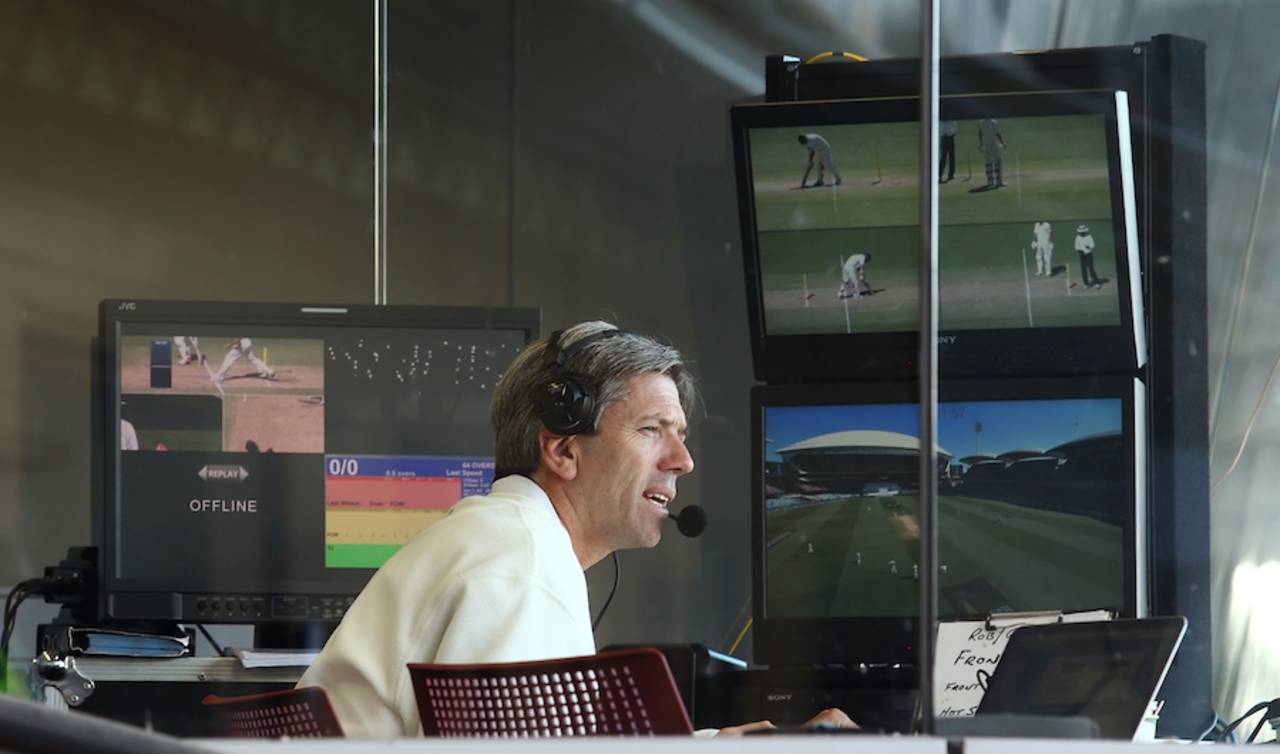Adelaide Oval cannot often have been compared with Southwark Crown Court. Other than their riverside placement, the two venues would appear to share little in function, design, capacity and purpose. Recently one played host to a dramatic acquittal, as evidence that had been stacked up against the accused man was rejected. The other saw
Chris Cairns cleared of perjury.
Both decisions have resulted in disappointment for certain parties. The Crown Prosecution Service would have been disappointed that the jury considered its case against Cairns to be less than watertight. In terms of outpourings of sheer disbelief, however, the
reaction to Nathan Lyon's
escape easily eclipsed any reaction to the clearing of Cairns.
The way one reacts to decisions is widely perceived as an integral part of cricket, so much so that it is laid out in the
Preamble to the Laws. As woolly as some parts of the preamble may be, nonetheless surely this is clear enough: "The Spirit of the Game involves RESPECT for […] the role of the umpires. […] It is against the Spirit of the Game to dispute an umpire's decision." Similar wording is found in the Laws themselves, in
Law 42.18.
RESPECT indeed, in capital letters, perhaps spelled out by Aretha Franklin. Strictly speaking, of course, these words only apply to the players on the field of play. Commentators, journalists, crowd members, all and sundry can air their discontent with little fear of any repercussion.
However, it wasn't quite the same when the ICC, the sport's governing body and also Nigel Llong's employer,
broke its silence. It's unusual enough for the ICC to publicly comment on umpiring matters, yet the ICC media department took to Twitter to declare that "ICC has reviewed the decision and acknowledged that it was incorrect. […] ICC confirms the umpire followed the correct protocol, but made an incorrect judgement."
An "incorrect judgement"? What is meant by that? Presumably that Llong should have been less doubtful about the provenance of the Hot Spot mark, and that ultimately he should have come to a different conclusion. Yet that is the umpire's role: to evaluate the evidence and make unbiased decisions as a disinterested party.
On the contrary, and strange though it may seem to say it, Llong's decision was correct, in that he gave the right response according to protocol, based on his assessment of each factor set before him. It was his assessment that was at odds with most people's view, my own included. (A jury of 12 might well have judged differently, of course; the practicalities of implementing such a system rule such a move out, although they provide an entertaining fantasy to toy with. I, for one, can't wait for the release of 12 Angry Batsmen.)
To alter the situation: say that Llong went through the same reasoning process, again believed there was no conclusive evidence, but decided to give Lyon out. Would that have been the correct decision? No, for that would not have been the decision demanded by his assessment.
When protocol hasn't been followed, it's quite right for the ICC to admit umpiring error, as indeed it did
earlier this year when Aleem Dar and Kumar Dharmasena incorrectly gave James Anderson out when the ball was dead. For the ICC, however, to wade in and comment on the correctness of an umpire's individual judgement doesn't sit well with me. Indeed, this risks unintentionally undermining Llong's position and reducing respect for the role. Having said that, it is commendable that the ICC did not subsequently remove him from the firing line but backed him by sending him to New Zealand to officiate.
Should conclusive evidence always be required to establish a batsman's "guilt", or should decisions be made on the balance of probabilities?
Does the principle of showing respect prevent us expressing disagreement as observers? Not at all. It's perfectly in order for us to comprehensively disagree with the umpire's assessment, while respecting his decision as valid.
I'm clearly verging on the pedantic. I'm not proposing a wholesale adjustment in how we refer in casual conversation to umpiring decisions as right or wrong, or on the even more slippery words good and bad. But I do believe that comments from official bodies such as the ICC can subtly influence the respect given or not given to the "role of umpires" and their decisions, to go back to the MCC's Preamble.
Lurking not too far away from this discussion, and waiting for future debate, is the question of what the standard of proof should be in cricket. Should conclusive evidence always be required to establish a batsman's "guilt", or should decisions be made on the balance of probabilities?
This brings us back to the Cairns trial, in which, since it was a criminal case, the standard of proof had to be, quite rightly, beyond reasonable doubt. On this basis, Cairns' acquittal was not merely understandable but justified. The jury made its assessment: we might agree or disagree with it, but we are best served by respecting the process, its participants, and the verdict returned.
Interestingly the ICC also made an official statement regarding the Cairns case: "The ICC notes the decision of the jury finding Mr Chris Cairns not guilty and confirms its utmost respect for the process that has been followed." Quite: now to apply the same standard to the deliberations of umpires.
Liam Cromar is a freelance cricket writer based in Herefordshire, UK @LiamCromar
